| Srl | Item |
| 1 |
ID:
090178
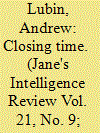

|
|
|
|
|
| Publication |
2009.
|
| Summary/Abstract |
In January, incoming US President Barack Obama announced that the controversial Guantanamo Bay detention facility would be closed by January 2010. Eight months later, the exit strategy appears to have shifted, with Jeh Johnson,a lawyer at the Department of Defense, telling a Senate committee on 10 July that some detainees could be held indefinitely.
|
|
|
|
|
|
|
|
|
|
|
|
|
|
|
|
| 2 |
ID:
154866
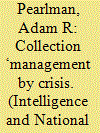

|
|
|
|
|
| Summary/Abstract |
This article examines human intelligence collection in wartime, and offers a methodology to help determine the relative success or failure of the detainee interrogation mission at Guantanamo Bay, Cuba (GTMO). It surveys the relevant background on GTMO, a brief history on interrogations during World War II and Vietnam, and draws comparisons among them to be considered in potential future mass-interrogation missions. Drawing from documentary research and two dozen original interviews, it argues that, to the extent an intelligence mission was one of the purposes of transferring detainees to GTMO, the relevant metric of success is whether collectors were able to obtain more or ‘better’ intelligence from the detainees than they would have been able to in-theater. At the strategic level, then, GTMO’s value to intelligence collectors is to be assessed at the margins, rather than the absolute value of the information educed.
|
|
|
|
|
|
|
|
|
|
|
|
|
|
|
|
| 3 |
ID:
130986
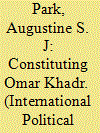

|
|
|
|
|
| Publication |
2014.
|
| Summary/Abstract |
Until 2012, Omar Khadr was both the only former child soldier and Western national left in Guantanamo Bay. Captured by US forces at the age of 15, this Canadian youth would spend more than 40% of his life in US custody during the War on Terror. This article advances two key arguments. First, as a child soldier, Khadr is simultaneously cast as an object of sympathy and suspicion. The construction of Khadr's childhood is animated by a cultural racism, which casts Khadr as both a victim of an extremist family and the evil outcome of a "jihadi" upbringing. Second, this article examines competing culturally racialized claims about citizenship, prompted by the failure of the Canadian government to seek Khadr's repatriation. While the central preoccupation of liberal citizenship discourse is the erosion of Canada's identity as a Western, liberal democracy, "racial-nationalist" discourse raises the alarm on the threat posed by "citizens of convenience" who must be cast out of the polity through practices of "pure exclusion."
|
|
|
|
|
|
|
|
|
|
|
|
|
|
|
|
| 4 |
ID:
118197
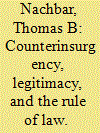

|
|
|
| 5 |
ID:
102698
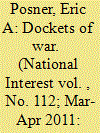

|
|
|
|
|
| Publication |
2011.
|
| Summary/Abstract |
SMART BOMBS cannot take out WikiLeaks. Stealth bombers cannot eliminate the bad odor wafting around Guantánamo Bay. Unmanned drones armed with Hellfire missiles cannot stop foreign countries and NGOs from putting America "on trial" for targeted killings. Lawfare is taking over international relations-or so many people believe. The most awesome military power in the world blunders about like a helpless giant in a dark room, swarmed by hostile forces that it cannot see and cannot attack.
|
|
|
|
|
|
|
|
|
|
|
|
|
|
|
|
| 6 |
ID:
090182
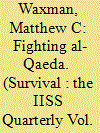

|
|
|
|
|
| Publication |
2009.
|
| Summary/Abstract |
Among President Barack Obama's first acts was to announce the closure of the detention facility at Guantanamo Bay and strict limits on the Central Intelligence Agency's interrogation authority. These announcements were greeted in the United States and Europe alike with euphoria among critics of the George W. Bush administration, who saw them as signalling an end of the entire global war on terror paradigm.
|
|
|
|
|
|
|
|
|
|
|
|
|
|
|
|
| 7 |
ID:
082353
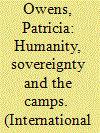

|
|
|
|
|
| Publication |
2008.
|
| Summary/Abstract |
This article responds to the commentary on my book, Between War and Politics: International Relations and the Thought of Hannah Arendt, by Helen M. Kinsella, Richard Beardsworth and Anthony Burke. Burke's claim that Arendt betrays a 'normative defeatism' based solely on his reading of Origins of Totalitarianism is misguided. It is a narrow reading to suggest that Arendt was uninterested in institutions and laws more cosmopolitan in intent than traditional inter-state law. In response to Beardsworth, I argue that Arendt's criticism of the reduction of all politics to violence is not normative in the way he suggests. Nor is it 'merely' to repeat the 'Schmittian/realist argument that conflict is irreducible'. Arendt's agenda is different. Finally, I respond to Kinsella's provocative defence of some concordance (as distinct from equivalence) between the Nazi concentration camps of World War II and US-run camps at Guantanamo Bay, Cuba.
|
|
|
|
|
|
|
|
|
|
|
|
|
|
|
|
| 8 |
ID:
071089
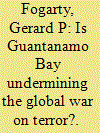

|
|
|
| 9 |
ID:
099894
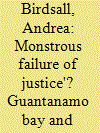

|
|
|
|
|
| Publication |
2010.
|
| Summary/Abstract |
This article considers challenges to the existing international human rights regime in the post-9/11 era. It uses an interdisciplinary approach that brings together issues of politics and law by focussing on international legal provisions and setting them into the context of International Relations theory. The article examines the establishment of Guantanamo Bay as a detention centre for suspected terrorists captured in the 'war on terror' and focuses on violations of international human rights and humanitarian law in the name of national security. This article demonstrates that the wrangling over Guantanamo Bay is an important illustration of the complex interaction between interests and norms as well as law and politics in US policy making. The starting point is that politics and law are linked and cannot be seen in isolation from each other; the question that then arises is what kind of politics law can maintain.
|
|
|
|
|
|
|
|
|
|
|
|
|
|
|
|
| 10 |
ID:
119769
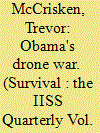

|
|
|
| 11 |
ID:
111184
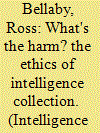

|
|
|
|
|
| Publication |
2012.
|
| Summary/Abstract |
As the professional practice of intelligence collection adapts to the changing environment and new threats of the twenty-first century, many academic experts and intelligence professionals call for a coherent ethical framework that outlines exactly when, by what means and to what ends intelligence is justified. Reports of abuse at detention centres such as Guantanamo Bay and Abu Ghraib, the ever increasing use of technological surveillance, and the increased attention on the use of torture for intelligence collection purposes have all highlighted a need to make an explicit statement about what is and what is not permissible intelligence practice. In this article an ethical framework will be established which will outline under what circumstances the use of different intelligence collection activities would be permissible. This ethical framework will first underline what it is about intelligence collection that is 'harmful' and, therefore, should be prohibited under normal circumstances. The ethical framework then outlines a set of 'just intelligence principles', based on the just war tradition, which delineate when the harm caused can be justified. As a result, this article outlines a systemic ethical framework that makes it possible to understand when intelligence collection is prohibited and when it is permissible.
|
|
|
|
|
|
|
|
|
|
|
|
|
|
|
|